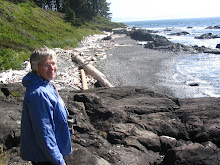
So what does this have to do with books? Part of the story in the book is the conflict between those wanting to digitize the books in a University library and those wanting to preserve the actual books on the shelf. The way of digitizing the books is to throw the books in a wood chipper machine and digitize all the bits of information as the bits of pages swirl by. This destroys the physical entity of the book but preserves it as a digital entity.
Earlier in the summer, I participated in a discussion about reading online. I came across some interesting writing by Kevin Kelly.
Kelly (2006) wrote about the process of scanning of books. "In the heart of Silicon Valley, Stanford University (one of the five libraries collaborating with Google) is scanning its eight-million-book collection using a state-of-the art robot from the Swiss company 4DigitalBooks. This machine, the size of a small S.U.V., automatically turns the pages of each book as it scans it, at the rate of 1,000 pages per hour. A human operator places a book in a flat carriage, and then pneumatic robot fingers flip the pages — delicately enough to handle rare volumes — under the scanning eyes of digital cameras."
Kelly (2006) says that the books that are scanned can then be accessed digitally. Unfortunately there will be items missing from the grand library of scanned writing-- "The grand library naturally needs a copy of the billions of dead Web pages no longer online and the tens of
 Image by heather via Flickr
Image by heather via Flickr
Kelly (2006) has a vision for this digitized and connected library "When that happens, the library of all libraries will ride in your purse or wallet — if it doesn't plug directly into your brain with thin white cords. Some people alive today are surely hoping that they die before such things happen, and others, mostly the young, want to know what's taking so long. (Could we get it up and running by next week? They have a history project due.)" Kelly talks about the option in the future to create one's own virtual bookshelf filled with a phrase from this book, a chapter from that--somewhat like a playlist on an I-Pod.
Kevin's picture of the future of "book learning" and Vernor Vinge's image have many similarities. In Kevin's picture, there are still thin white cords while in Vernor's image, there are no white cords. In both images, the digitized bits of information are accessible to the whole world.
I like the idea of information being accessible to the entire world. However, I do not want to see actual physical books disappear or be destroyed in the process of digitizing them. There will always be room for more books in my study carrel or on the floor beside my bed. I love books. I also love reading online. However, when I head to bed and read before I sleep, I want to hold an actual book or magazine in my hand. Somehow it wouldn't be quite the same to hold my laptop.
 Image via Wikipedia
Image via Wikipedia
What do you think of the future of books?
References:
Kelly, K. (2000). Will we still turn pages? In Time Magazine. Online at http://www.kk.org/writings/time_turn_pages.php (June 17, 2000)
Kelly, K. (2006). Scan this book. In the New York Times magazine. Online at http://www.nytimes.com/2006/05/14/magazine/14publishing.html?_r=1
![Reblog this post [with Zemanta]](http://img.zemanta.com/reblog_e.png?x-id=3fd2b7cb-3d6e-443d-b231-0de638cd5c7f)





No comments:
Post a Comment